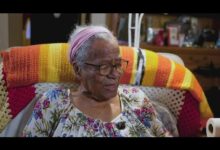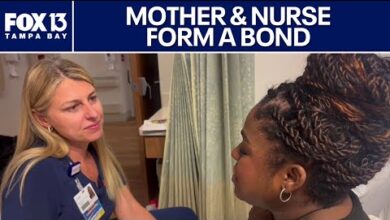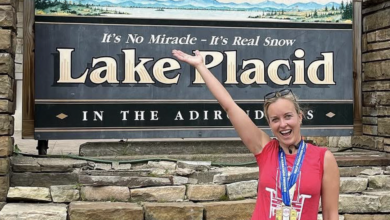Former nurse leader reflects on career in Northern Ireland

Northern Ireland has a “tremendous amount to be proud of” when it comes to developments in nursing, one of the country’s leading nurses has said as she reflects on her career.
Nicki Patterson, who was made an Officer of the Order of the British Empire (OBE) in the 2024 New Year Honours for services to health and social care in Northern Ireland, retired in March 2023 after 39 years in nursing.
“Northern Ireland doesn’t tend to blow its own trumpet, but I think a great deal of work is going on here”
Nicki Patterson
She undertook various roles across Health and Social Care (HSC) trusts as well as in the Department of Health in Northern Ireland and the Nursing and Midwifery Council.
Her most recent position was at South Eastern HSC Trust as director of nursing, primary care and older people and deputy chief executive.
Reflecting on the breadth of her career, she told Nursing Times that it had always been “a huge privilege to be a nurse”.
Ms Patterson’s first job was as a ward sister at the Royal Victoria Hospital in Belfast, after she qualified in 1987.
She joined the profession during the middle of The Troubles – a period of civil unrest and conflict in Northern Ireland which resulted in the deaths of thousands of people.
“I was an 18-year-old girl who’d grown up sheltered very much from The Troubles,” said Ms Patterson. “Suddenly, there I was in the Royal Victoria Hospital, with people coming in on a regular basis having been shot. It was a real culture shock.”
One of Ms Patterson’s earliest memories of nursing was working on a fractures ward, where prisoners, police and soldiers from all sides of the conflict would come in for treatment.
She noted that a “fundamental part of nursing is about being non-judgemental” and caring for all of those in need, which she said she did throughout The Troubles.
Ms Patterson added: “Whilst at times it was tough, I feel proud of what myself, and the teams who I worked with, did during what was not normal times and, sometimes, quite frightening times.”
Another huge challenge in Ms Patterson’s career was leading her trust’s response to the Covid-19 pandemic, something she said had been reflecting a lot on since her retirement. “It’s emotional even thinking about it,” she said.
During the height of the pandemic, Ms Patterson split her time between being in the boardroom and making strategic decisions and continuing to work clinically.
“I went out with teams to care homes to vaccinate [and] I think staff very much appreciated that,” she explained, adding: “It gave me the opportunity to firsthand, through conversations, see how they were and how they were coping.”
Ms Patterson said HSC services should be “incredibly proud” of how they managed through the pandemic.
She added: “I’m proud of what my contribution was. I know that when I reflect back now, it will certainly be a part of my career that I will never forget.”
At the time of writing, Northern Ireland was still without a fully functioning devolved government, in a political row that has coincided with nurses falling out of pay parity with their UK counterparts.
Asked what she would say to nurses who may be feeling stressed or ignored during this time, Ms Patterson said her message would be around “maintaining hope” and for nursing to “speak as a cohesive voice”.
Ms Patterson said she did not concur with the narrative that pressures had become “much worse” for nursing in the Northern Ireland, arguing instead that the issues facing the profession had changed.
She said: “There is no doubt there are pressures, but there have been challenges throughout the 39 years I’ve worked in the service and I’m quite sure there will be some challenges in the 39 years after I’ve gone.”
Meanwhile, Ms Patterson said there was “a tremendous amount to be proud of” in Northern Ireland in terms of advancing and improving nursing practice and service delivery, but that the country did not always “shout it from the rooftops”.
“Northern Ireland doesn’t tend to blow its own trumpet, but I think a great deal of work is going on here,” she argued.
Achievements cited by Ms Patterson included the fact that Northern Ireland had the biggest number of Open University pre-registration commissioned places in the whole of the UK, and that the country had “a real sense of collegiality across the senior nursing profession”.
Currently, Ms Patterson has no plans to return to nursing in a formal capacity, but she said she had not ruled it out completely.
She noted that there were “a huge amount of transferable skills in nursing” which she had been using every day.
“I didn’t realise the extent to which so much of what I have learned and had the privilege of being involved in over the years, actually transfers into life in general,” she said.
“You don’t need to be in an employee role to be able to utilise and draw on it.”







